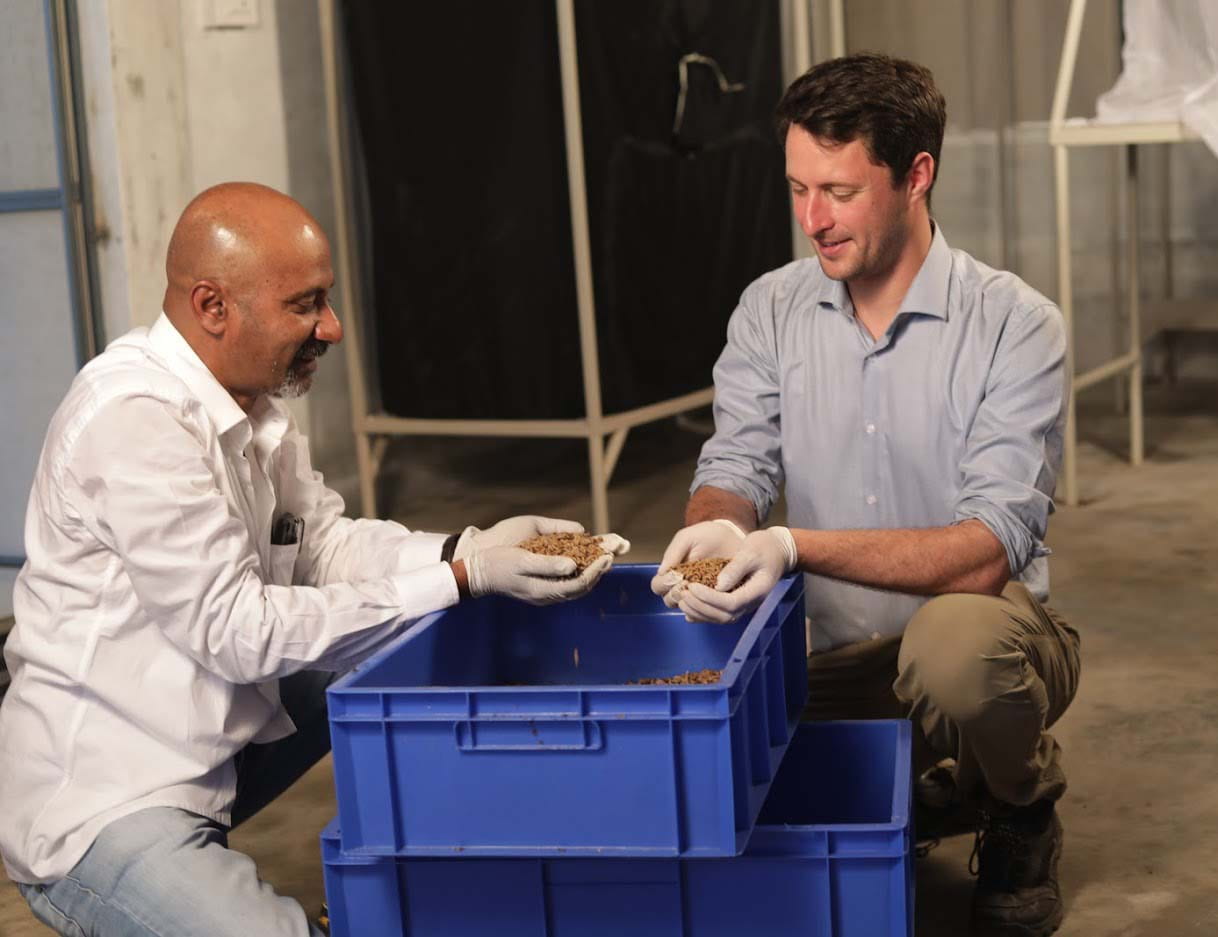
NEWSROOM
Student’s pilot maggot farm in India to process waste
26 June 2019
A student’s venture which uses maggots to process waste into fertiliser and chicken feed has set up its first treatment plant in India.
Hexacycle is the brainchild of University of Auckland PhD student Neil Birrell, an entomologist who is studying insects for human consumption in the Faculty of Science. His idea to use the larvae from the Black Soldier Fly to reduce organic waste in landfill was first developed when he participated in the Centre for Innovation and Entrepreneurship’s Summer Lab programme. Buoyed by his experience, Neil continued to develop and validate his venture concept through participating in the Centre’s Velocity programme. Neil went on to win the social entrepreneurship category of the University’s Velocity $100k Challenge.
Since then Hexacycle has received mentoring and support from Velocity to scale up the concept, taking it from a prototype fly hatchery in Neil’s back garden to India’s first black soldier fly treatment plant in less than three years.
The treatment plant, in the south-western coastal state of Kerala, enables Hexacycle to refine and develop this technology, before introducing it to other waste processing plants, particularly in developing countries.
“Our pilot plant is entirely sustainable and zero-waste,” Neil explains. “The larvae are ground into a high-protein poultry feed for the chickens on-site, and the excrement processed into frass, a type of organic fertiliser.”
It currently processes 200kg of pre-consumer food waste a day with plans to increase capacity to three tonnes per day. The waste is collected from local restaurants.
Initially Hexacycle planned to establish a pilot plant in New Zealand, but the strict waste regulations proved too expensive and challenging to overcome.
“Don’t get me wrong, New Zealand’s regulations are really important, they protect our environment,” Neil says. “But the resource consent process is expensive, particularly for pre-seed start-ups that are looking to test their product on a larger scale.”
It was only by chance that Neil set up the plant in India. Late last year, he got chatting to a taxi driver on Waiheke Island after missing the bus on his way to a wine tour and he and the driver got chatting.
“It turned out he owned an import/export business and a plantation in Kerala, and had a cousin who owned a large poultry farm,” Neil says “Six months later I was on my way to India.”
The taxi driver, whose name is John Ashok, helped Hexacycle navigate the language and cultural barriers to establish the plant.
While the concept of maggots chewing through waste is not new, Hexacycle’s technology automates the mating and reproduction part of the process, which Neil describes as a ‘pain point’.
“The reproductive part of the black soldier fly life cycle is difficult and can be expensive,” Neil says.
“Our technology focuses on the mating and hatching of eggs using low cost and energy efficient lighting, instead of the traditional glass housing used overseas.”
The initiative now has two co-founders in New Zealand, who mostly work on the venture in the evenings. Three employees in Kerala have been trained on rearing the black soldier fly larvae and processing the waste.
“India is a beautiful country, and Kerala state in particular has stunning wildlife and so many amazing insects. However it also has huge problems with waste management,” Neil says.
“I saw a lot of rubbish being dumped by the side of the road or in wetlands. Waste is a very sensitive issue in Kerala and engagement with the community has been a vital part of our process.”
Hexacycle has received enthusiastic support from Kerala’s business community and authorities.
“We’ve been interviewed by newspapers, radio and television in India and met the Minister of Agriculture for Karnataka. It has been surreal. I’d wake up to newspaper clippings with my photo in them and not have the foggiest what they were saying.”
In the meantime Hexacycle is establishing a second pilot plant in Kerala at a nearby poultry farm, and is talking to companies in developing countries to build and implement waste processing plants.
Stuff article: University of Auckland student creates maggot farm to process food waste


26 June 2019
A student’s venture which uses maggots to process waste into fertiliser and chicken feed has set up its first treatment plant in India.
Hexacycle is the brainchild of University of Auckland PhD student Neil Birrell, an entomologist who is studying insects for human consumption in the Faculty of Science. His idea to use the larvae from the Black Soldier Fly to reduce organic waste in landfill was first developed when he participated in the Centre for Innovation and Entrepreneurship’s Summer Lab programme. Buoyed by his experience, Neil continued to develop and validate his venture concept through participating in the Centre’s Velocity programme. Neil went on to win the social entrepreneurship category of the University’s Velocity $100k Challenge.
Since then Hexacycle has received mentoring and support from Velocity to scale up the concept, taking it from a prototype fly hatchery in Neil’s back garden to India’s first black soldier fly treatment plant in less than three years.
The treatment plant, in the south-western coastal state of Kerala, enables Hexacycle to refine and develop this technology, before introducing it to other waste processing plants, particularly in developing countries.
“Our pilot plant is entirely sustainable and zero-waste,” Neil explains. “The larvae are ground into a high-protein poultry feed for the chickens on-site, and the excrement processed into frass, a type of organic fertiliser.”
It currently processes 200kg of pre-consumer food waste a day with plans to increase capacity to three tonnes per day. The waste is collected from local restaurants.
Initially Hexacycle planned to establish a pilot plant in New Zealand, but the strict waste regulations proved too expensive and challenging to overcome.
“Don’t get me wrong, New Zealand’s regulations are really important, they protect our environment,” Neil says. “But the resource consent process is expensive, particularly for pre-seed start-ups that are looking to test their product on a larger scale.”
It was only by chance that Neil set up the plant in India. Late last year, he got chatting to a taxi driver on Waiheke Island after missing the bus on his way to a wine tour and he and the driver got chatting.
“It turned out he owned an import/export business and a plantation in Kerala, and had a cousin who owned a large poultry farm,” Neil says “Six months later I was on my way to India.”
The taxi driver, whose name is John Ashok, helped Hexacycle navigate the language and cultural barriers to establish the plant.
While the concept of maggots chewing through waste is not new, Hexacycle’s technology automates the mating and reproduction part of the process, which Neil describes as a ‘pain point’.
“The reproductive part of the black soldier fly life cycle is difficult and can be expensive,” Neil says.
“Our technology focuses on the mating and hatching of eggs using low cost and energy efficient lighting, instead of the traditional glass housing used overseas.”
The initiative now has two co-founders in New Zealand, who mostly work on the venture in the evenings. Three employees in Kerala have been trained on rearing the black soldier fly larvae and processing the waste.
“India is a beautiful country, and Kerala state in particular has stunning wildlife and so many amazing insects. However it also has huge problems with waste management,” Neil says.
“I saw a lot of rubbish being dumped by the side of the road or in wetlands. Waste is a very sensitive issue in Kerala and engagement with the community has been a vital part of our process.”
Hexacycle has received enthusiastic support from Kerala’s business community and authorities.
“We’ve been interviewed by newspapers, radio and television in India and met the Minister of Agriculture for Karnataka. It has been surreal. I’d wake up to newspaper clippings with my photo in them and not have the foggiest what they were saying.”
In the meantime Hexacycle is establishing a second pilot plant in Kerala at a nearby poultry farm, and is talking to companies in developing countries to build and implement waste processing plants.
Stuff article: University of Auckland student creates maggot farm to process food waste
EMAIL
CIE@AUCKLAND.AC.NZ
POSTAL ADDRESS
THE UNIVERSITY OF AUCKLAND BUSINESS SCHOOL
PRIVATE BAG 92019, AUCKLAND













